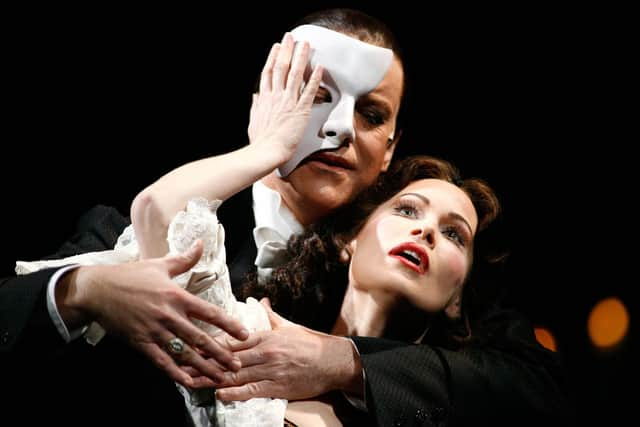Brexit's damaging impact on musicians means Humza Yousaf's warm words about funding must translate into reality – Professor Jeffrey Sharkey
Ever since Brexit became the reality for our country, I’ve had a paraphrase of John Donne’s “No man is an island entire of itself; every man is a piece of the continent, a part of the main” running through my mind. “No one is an island” but we have been islanded in a sea of culture.
Our musical culture has been connected to the world and most directly to our nearest neighbours in Europe for centuries. Our wonderful Scottish traditional music bears the influence of Irish, Danish, Breton and other Scandinavian influences, as much as it is indigenous to our shores.
Advertisement
Hide AdAdvertisement
Hide AdOur classical music development was always an offshoot of the continent – with song and opera originating in Italy, the Germanic tradition taking hold in the classical and romantic period, and our island responding and adapting in its own unique way – but adapted to its cultural neighbours with a free exchange of artists flowing between the natural border of the North Sea. The sea as a border was challenge enough, but the visa restrictions for touring artists, the challenges in recruiting talented Europeans to come and study with us, and the loss of culturally diverse voices to study alongside our Scots are all taking their toll on performing artists.
One of the most recent and telling articles on the impact of Brexit on musicians appeared in the New European. It focuses on several individual challenges to finding work in Europe, post-Brexit, and the lack of enough opportunities within the UK. “For hundreds of years musicians have moved across the Channel for work, learning and audiences,” wrote Suna Erdem. “Classical music is collaborative and international, Brexit is not. It introduced barriers to work and travel, expensive paperwork that most musicians cannot afford, and sent young British artists down the pecking order when it comes to plum European jobs. Everything from vital orchestra tours to singing gigs and study opportunities have been affected.”
The Musicians’ Union surveyed its members and reported stark challenges that bring to life that summary statement. They reported that 77 per cent of musician members expected their earnings to decrease due to red tape, 42 per cent would consider moving to another country if they could and 21 per cent were considering a change of career. The Guardian recently reported that average salaries for musicians in the UK dropped to £14,000, exacerbated by difficulties supplementing work in Europe.
The performing arts were thought of too late, if at all, in the series of complex negotiations to leave the EU. This inattention to the challenges for artists is in spite of the contribution that the creative arts and industries make to the UK economy – £111 billion, with £5.8 billion to Scotland alone.
The loss of the Erasmus programme has been devastating in the arts. It was two-way, providing musicians, actors and dancers from differing cultural perspectives a pathway to engage with our home students and influence how they express their own art. It offered life-enhancing experiences for Scots to study abroad and for our faculty and professional staff to enhance their own practice.


It also meant we had a regular pipeline of Europeans who fell in love with Scotland and chose to study here for a Masters degree. The replacement programme offered by the UK, Turing, is one-directional and now it’s even more challenging to achieve funding for small specialist institutions like our conservatoire.
Scotland promised a replacement Erasmus programme but has not yet delivered one, though the proposed Scottish Education and Exchange scheme might help a single student for a short period. Our UK conservatoires, including Scotland’s Royal Conservatoire of Scotland, have been a magnet for talent around the world and domestically. The innovation and artistry here is one reason why I chose to leave the United States and come to Scotland. I want us to be able to continue to attract and develop domestic and international artistic talent, while showing that the arts can be both accessible and world-leading.
With Brexit, I fear that we lost a deep connection to countries that care deeply about the arts and which, in their caring, had a chance to influence our own governments who often seem to take them for granted. I am vice-president of the Association of European Conservatoires and work hard to maintain the visibility of UK conservatoires. But now it is very hard to have a performing career funded solely in the UK. This diminishment is causing people to leave the arts as they cannot finance a long-term career. The country will notice, but perhaps only after it is gone.
Advertisement
Hide AdAdvertisement
Hide AdThe pledge this week from First Minister Humza Yousaf to double funding for arts and culture in Scotland over the next five years is welcome. The words themselves and his assertion that culture and arts should be valued, not just for their economic impact, but “for the joy they bring the world” will bring a sense of worth to a Scottish artistic community of individuals and organisations that is right now utterly beleaguered and despondent. Now we need deeds to follow the warm words.
Artists are the connectors, creators and envoys of Scotland, within our communities and across the world. I hope that we can connect more easily with our neighbours in Europe and beyond, and not live with continuing precarity. Artists can then help rebuild our own society and our connections with others through expression of our common humanity.
Professor Jeffrey Sharkey, a fellow of the Royal Society of Edinburgh, is principal of the Royal Conservatoire of Scotland
Comments
Want to join the conversation? Please or to comment on this article.